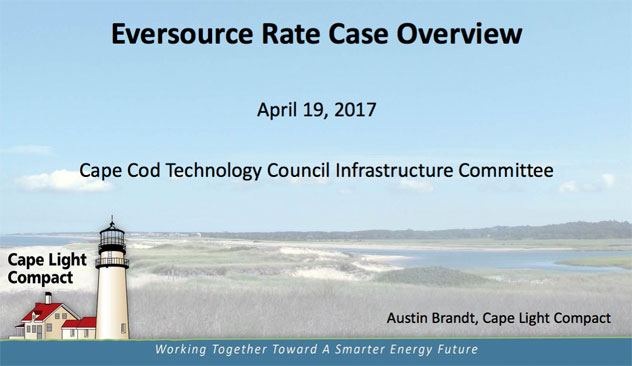
Austin Brandt, Power supply planner for the Cape Light Compact, came to the April Infrastructure Committee meeting to update us on the Rate Case Public Hearings.
Changes in the Rate Case are a general increase in rates, alignment of rate classes between NSTAR and WMECo (Western Massachusetts Electric Co), consolidation of NSTAR rates, and changes to rate structures – including a charge for net-metered customers. EverSource is asking for permission to formally consolidate NSTAR & WMECo so they are no longer working as separate entities.
Austin said Eversource has proposed the rate increase to recover an annual revenue deficiency of about $96 million. The deficiency they’re claiming is based on revenue, capital expenses, operating expenses and rate of return during a test year. The rate of return is regulated by the Department of Public Utilities (DPU).
As part of the rate case they are reducing the over 63 rate classes to 10, and aligning rate classes between NSTAR and WMECo. Under the proposed plan, customers from Cape Cod to Western MA would pay the same rates as long as they are in the same rate class.
There is also a proposal to increase fixed customer charges from $3.75 to $8 for resident non-heat customers, as well as increasing the low-income discount, recovering the cost from other, non-low income customers.
Monthly minimum reliability contribution
Net-metered customers may see an increased fixed customer charge, above non net-metered customer charges, to more accurately reflect the cost of maintaining the grid. Austin says EverSource proposes collecting this through a demand charge based on peak use, since the system is built to supply peak demand.
Austin explained that by reducing the per-kWH rate utility companies reduce the net metering credit value, making local supply less attractive while collecting an amount from net-metered customers to maintain fixed grid costs. A representative from CVEC noted that these proposals disincentivize green energy and are not congruent with the Global Warming Act.
Decoupling and PBRM
There is also a proposal for a performance-based ratemaking mechanism (PBRM) to decouple revenue from kWh sales and comply with DPU Order 07-50-A which removes disincentives. To reach our green house reduction goals, Austin explained, we don’t want utilities motivated to sell more. Performance Based Ratemaking Mechanism adjusts rates annually in accordance with revenue-cap formula, in tandem with decoupling. All Eversource rate case docket filings can be found by visiting the DPU File Room Website, selecting Dockets/Filings, Docket by Number, 17-05.
Grid Modernization Base Commitment
Some of what they’re proposing are foundation items taken out of the grid modernization docket we discussed in previous meetings. This includes many of the grid-facing improvements proposed in the grid mod filing including foundational investments in automation and sensing technology, investments in grid-scale energy storage, DER customer portal, and EV charging infrastructure.
Austin said Cape Light Compact is concerned with the rate design and how they are assessing charges – especially flat customer charges. “We are aggressively energy efficient here,” he said of the Cape. With flat customer charges, reducing usage doesn’t have the same financial impact. Demand-based rates for residential net-metered customers doesn’t encourage efficient behavior, and makes it harder for small commercial customers to manage bills and usage.
CLC is making sure the formula for PBRM is reasonable and doesn’t include windfalls for the company. They are also interested in the grid modernization investments, wanting to make sure they are prudent investments, with a mechanism to check on the return.
Austin reported that the CLC governing board voted to intervene in rate case at their 1/11/17 meeting. They petitioned for and were granted intervening status, which means they can ask discovery questions, sponsor witness testimony, cross examine other witnesses, and file briefs to sum up their position based on evidentiary hearings. They are aligned with many of the other interveners and plan to sponsor witnesses to testify on PBRM, rate consolidation, and impact on the Cape and Vineyard.
The procedural schedule and instructions for filing public comment are on the Cape Light Compact website: www.capelightcompact.org. CLC encourages individuals and organizations to attend public hearings and submit written comments to the DPU. The public comment period ends on 5/31/17.
There will be an infrastructure committee meeting before the end of the public comment period.
